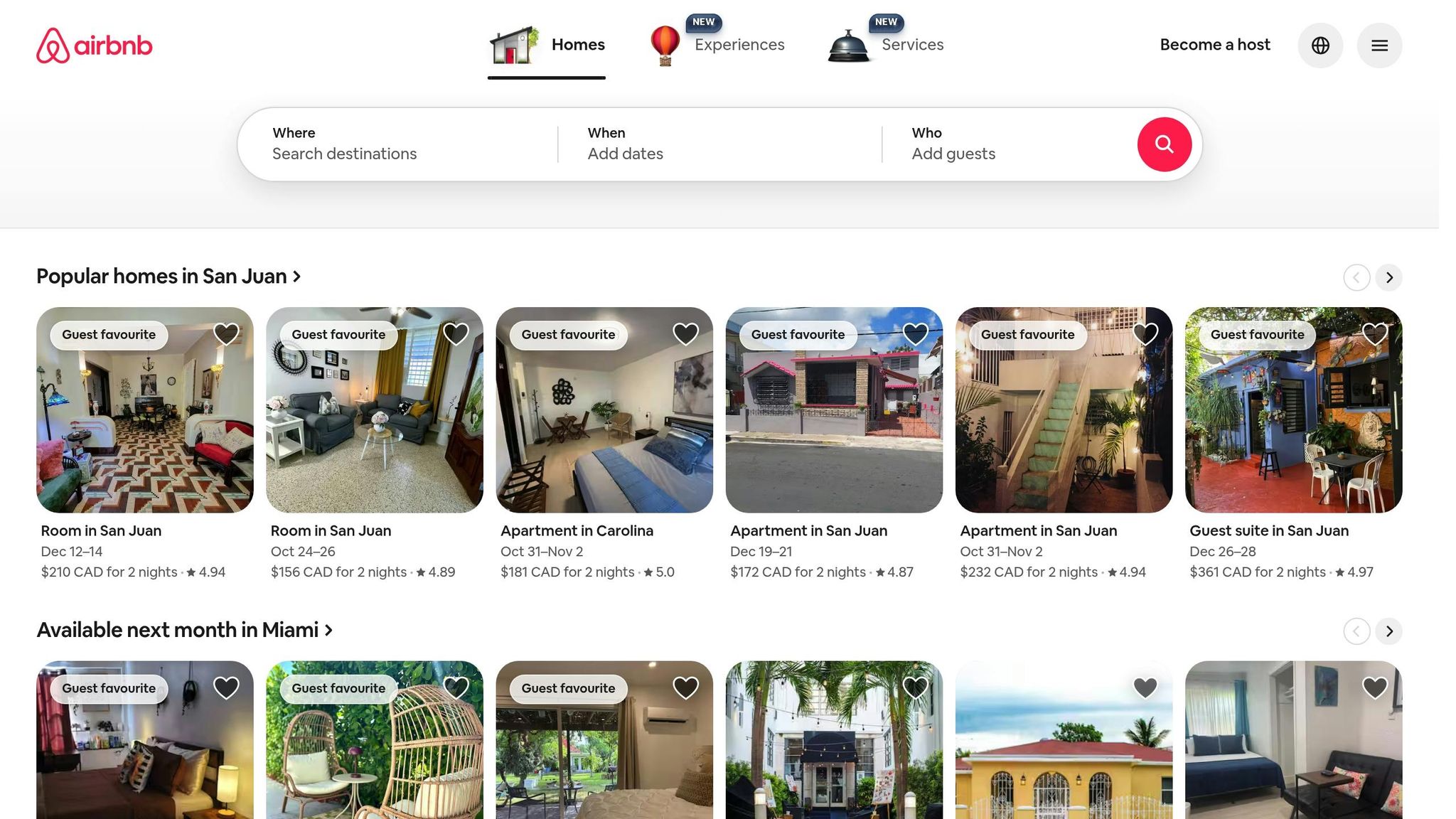Urban condos in Halifax and Dartmouth offer income opportunities through short-term rentals (STRs), but success hinges on navigating strict condo board rules, municipal regulations, and market conditions. Here’s what you need to know:
- Demand: Halifax attracts tourists, business travellers, and temporary residents, especially in downtown areas near the waterfront or major transit hubs.
- Regulations: STRs require provincial registration, including condo board consent, and must comply with municipal zoning, safety, and tax rules.
- Profitability: Prime locations and peak seasons (e.g., summer) drive higher occupancy and nightly rates. However, costs like condo fees, cleaning, and compliance can impact margins.
- Condo Rules: Many boards limit STRs with restrictions on rental periods, guest registrations, and access to shared amenities. Clear communication with boards is critical.
- Best Practices: Set clear house rules, screen guests carefully, and maintain safety standards to avoid disputes and protect your investment.
STR operators who comply with regulations, maintain good relationships with condo boards, and adjust to market trends can still thrive, even as stricter rules reduce competition.
Should we sell our Airbnb in Halifax, Nova Scotia?

STR Viability in Halifax and Dartmouth Urban Condos
Figuring out whether your urban condo can thrive as a short-term rental (STR) means taking a close look at market conditions, local rules, and financial expectations. Halifax and Dartmouth each bring unique benefits to the table, but success depends on balancing the opportunities with the challenges. Let’s dive into the market trends, regulations, and profitability factors that influence STR performance in these urban settings.
STR Market Trends in Halifax/Dartmouth
Halifax draws a mix of business travellers, tourists, and temporary residents, making it a hotspot for STRs. Condos near downtown attractions like the waterfront or business districts are particularly well-positioned to benefit from this demand.
However, stricter regulations have reduced the number of active STRs. While this means less competition for those who comply, it also adds layers of complexity for operators.
Seasonality plays a big role in STR performance. Summer is typically the busiest season, with higher occupancy rates and premium nightly prices. In contrast, winter often brings slower demand, requiring a more calculated approach to pricing and marketing. Many successful STR operators adapt by offering mid-term rentals during these quieter months, targeting professionals or students looking for extended stays.
Location is key. Condos in downtown Halifax - such as those near Spring Garden Road, Quinpool Road, or the waterfront - tend to perform exceptionally well. In Dartmouth, properties close to transit hubs like the ferry terminal or Alderney Landing often see strong booking activity.
Municipal and Provincial STR Regulations
To operate an STR in a Halifax or Dartmouth condo, navigating a web of municipal and provincial regulations is a must.
At the provincial level, you’ll need to register your STR with Tourism Nova Scotia. This process includes providing documentation, such as a Condo Board Consent Form, to confirm your building allows STRs.
Municipally, operators must adhere to business registration requirements, safety standards, and zoning rules. For instance, certain areas in downtown Halifax limit the percentage of condo units that can be used as STRs, so registering early can give you a competitive edge.
Failing to comply with these rules can be costly. Penalties include fines for both first-time and repeat violations. On top of that, STR operators must handle tax obligations, like collecting and remitting the harmonized sales tax (HST). If your rental income crosses specific thresholds, additional registration requirements may apply.
Profitability Factors for Condo STRs
Beyond meeting the legal requirements, profitability is the ultimate goal for any STR operator.
Occupancy rates are a major driver of profitability and depend heavily on location, pricing, and the quality of your property. Condos in prime areas of downtown Halifax tend to see higher occupancy, especially during peak tourist seasons.
Nightly rates also vary by season and location. Properties in downtown Halifax often command premium rates during busier months, while condos in less central areas may need to focus on competitive pricing. Off-season rates are generally lower, but strategic pricing can still attract guests.
Costs can add up quickly. Fixed expenses like condo fees and variable costs like professional cleaning and compliance fees need to be factored into your financial planning.
Flexibility is another key to success. Offering mid-term rentals during slower periods can help maintain steady occupancy levels throughout the year. Condos that combine great locations with professional management and adaptable rental strategies are more likely to achieve consistent profitability, even after accounting for all expenses.
Working with Condo Board Rules and Regulations
Running a short-term rental (STR) in Halifax or Dartmouth means navigating the rules set by your condo board. Since every building has its own bylaws, being proactive and transparent is key. Below, we’ll cover strategies for working with condo boards, getting approvals, and handling potential disputes.
Understanding Bylaws and Common Restrictions
Condo bylaws often come with specific restrictions for STR operations. One common rule is a required minimum rental period to reduce high tenant turnover. Some buildings lean towards longer-term rentals rather than traditional short-term stays. Additionally, boards may ask for advance registration of guest details, including names, contact information, and the length of stay, and they often limit the number of guests allowed per unit based on its size.
Shared amenities like pools, gyms, or parking spaces may also have restrictions for STR guests. For example, guests might be barred from using certain facilities or face stricter rules for access. Noise and behaviour policies tend to be more rigid as well, with enforced quiet hours and specific house rules for guests. Insurance requirements are another area where STR operators may face additional demands, with some boards requiring extra coverage beyond standard homeowner policies.
Getting Condo Board Approval for STR Operations
Before seeking approval, take time to thoroughly review your building’s declaration and bylaws. This will help you understand any restrictions and prepare for potential challenges. Gather all necessary documentation, such as your business registration, proof of insurance, and a detailed operating plan, to show that you’re managing your STR responsibly.
A clear communication strategy is also essential. Outline how you’ll handle guest interactions and address any concerns that might arise. By aligning your STR plan with the board’s rules, you can protect your investment while ensuring your operation complies with building policies. Attending a board meeting to present your plan and answer questions can also go a long way in securing approval.
Handling Enforcement and Disputes
Conflicts with condo boards can happen, so it’s important to document all communications carefully. If a complaint is made - whether valid or not - respond promptly and professionally to help resolve the issue through direct dialogue and compromise.
For more complex disputes, consider hiring a professional STR management company. These experts can help you navigate regulatory compliance and mediate conflicts, often preventing issues from escalating. If necessary, you can also explore your rights under provincial condominium laws, though formal appeals can be both time-consuming and costly.
If the current bylaws seem outdated or overly restrictive, you might propose amendments. Show how updated rules could promote responsible STR operations, and consider building support from other unit owners. Maintaining good relationships with your neighbours and condo management is essential for the long-term success of your STR.
sbb-itb-b5e1074
House Rules and Best Practices for Condo STRs
Setting clear house rules and adhering to effective practices are key to running a successful short-term rental (STR) in Halifax or Dartmouth condos. Thoughtfully designed rules not only protect your property but also help maintain good relationships with neighbours and ensure compliance with municipal and condo-specific regulations.
Crafting House Rules for STRs in Condos
House rules for condos should address the unique challenges of shared living spaces while remaining inviting for guests. Noise control is particularly crucial in multi-unit buildings. Halifax Regional Municipality has specific noise limits: 60 dB during the day (7:00 AM–10:00 PM) and 55 dB at night (10:00 PM–7:00 AM). Make sure your guests understand and follow these limits to avoid complaints.
Parking instructions are another must-have. Many condos in Halifax and Dartmouth have limited visitor parking, and street parking can be tricky. Clearly outline where guests can park, whether permits are needed, and any time restrictions to prevent misunderstandings or conflicts with neighbours.
Waste disposal should be simple and straightforward. Provide guests with clear instructions on recycling schedules, garbage collection days, and where to place bins. Halifax has specific recycling rules, so include a quick reference guide to help guests sort items correctly. Poor waste management can lead to complaints from other residents or condo management.
Occupancy limits are equally important. These should align with both your condo’s bylaws and municipal rules, typically based on the number of bedrooms. Make sure guests know that exceeding the limit breaches the rental agreement. Also, include details about quiet hours, restrictions on common areas, and any amenities that are off-limits to STR guests.
Once your house rules are in place, focus on guest screening and communication to keep operations running smoothly.
Tips for Guest Screening and Communication
Screening your guests carefully can prevent potential issues. Before confirming a booking, review guest profiles, past reviews, and communication history to spot any red flags. Ask about the purpose of their visit, the size of their group, and whether they’ve stayed in condos before. Guests with prior experience in similar properties often have a better understanding of expectations.
Pre-arrival communication is a great way to set the tone for a positive stay. Share details about building access, parking, and house rules at least 24 hours before check-in. Automated messaging tools can help you stay consistent while saving time. Also, provide your contact information for emergencies but clarify when guests should reach out to building management instead.
During their stay, be available without being intrusive. Check in within the first few hours to ensure everything is in order and that guests understand the rules. Address any concerns promptly to prevent minor issues from escalating into larger problems that could involve the condo board.
Finally, keep your property safe and well-maintained to round out your best practices.
Maintenance and Safety Essentials
Safety starts with the right equipment. Install and regularly check smoke and carbon monoxide detectors throughout your property. Keep records of inspections and certifications handy for licensing or compliance checks. Replace batteries on a schedule and test devices between guest stays.
Emergency preparedness is more than just having safety equipment. Post clear evacuation plans and ensure emergency exits are well-marked and accessible. Keep common areas well-lit and ventilated. Fire extinguishers should be easy to find, regularly inspected, and certified. Provide guests with contact information for emergency services, building management, and yourself, ensuring they know how to reach you outside of regular hours.
Preventive maintenance can save you from costly emergency repairs. Schedule regular checks for plumbing, electrical systems, HVAC, and appliances. Efficient cleaning schedules can be managed with property management software, which also helps streamline maintenance tasks. Keep detailed records of inspections, repairs, and any incidents to demonstrate your commitment to responsible STR management.
If managing all these details feels overwhelming, consider hiring a professional STR management company. They can handle guest communication, maintenance, and emergency responses, giving you peace of mind while ensuring compliance with all regulations.
Common Condo STR Restrictions and Solutions
Condo boards in Halifax and Dartmouth often enforce rules that directly impact short-term rental (STR) operations. Understanding these restrictions is key to staying compliant and ensuring profitability.
Examples of Common Condo Restrictions
Condo corporations typically strike a balance between the needs of long-term residents and the realities of STR activities. Common rules include setting minimum rental durations, requiring advance notice for guest registrations, implementing parking guidelines, and restricting guest access to shared amenities.
In 2025, Halifax allocated $300,000 from a federal STR enforcement fund to hire seven new staff members[2]. This increased oversight could push condo boards to introduce stricter policies. For STR operators, staying ahead of these changes is crucial to maintaining operations in Halifax and Dartmouth.
These restrictions highlight the importance of a proactive approach when working with condo boards.
Building Good Relationships with Condo Boards
Maintaining a strong relationship with your condo board is essential for navigating regulatory changes and ensuring long-term success as an STR operator. Engaging with the board in a constructive and professional way can help address challenges more effectively.
Start by attending board meetings and introducing yourself as a responsible property owner. Show your commitment to the building’s reputation by sharing your house rules, guest screening practices, and emergency contact information. This transparency can go a long way in building trust.
When new restrictions are being discussed, focus on collaboration. For example, instead of opposing proposed rules, suggest practical solutions like adjusted quiet hours or enhanced noise control measures. Open dialogue can lead to compromises that work for everyone.
To avoid disputes, keep detailed records of guest registrations, parking arrangements, and communications. Many STR operators also provide monthly activity reports to their condo boards, demonstrating accountability and a commitment to community standards.
If managing these relationships feels overwhelming, consider partnering with an STR management service. These professionals can handle guest registrations, coordinate with building management, and ensure compliance with all condo regulations, saving you time and effort.
The number of active STR rentals in the Halifax Regional Municipality dropped significantly - from 2,418 in September 2023 to 1,218 by May 2025 - following the introduction of municipal bylaws[2]. For those who remain in the market, this presents a significant opportunity. However, success hinges on strict adherence to both municipal regulations and condo-specific rules, making strong relationships with condo boards more important than ever.
Conclusion: Maximizing STR Potential in Halifax/Dartmouth Condos
To succeed in the Halifax/Dartmouth short-term rental (STR) market, condo owners must focus on balancing compliance, profitability, and community engagement. As we’ve outlined, navigating the regulatory environment is key to unlocking the potential of STRs in urban condos.
One critical step is securing the Condo Board Consent Form, which ensures legal compliance and protects against fines or increased scrutiny that could eat into your profits [1]. Ignoring this requirement can quickly derail even the most promising STR ventures.
The numbers tell an encouraging story: STR hosts in Halifax generated $30.9 million in 2023, with entire home listings accounting for 90% of that revenue, even though they made up only 74% of all properties [1]. Add to this Nova Scotia's booming tourism sector, which saw 2.2 million visitors in 2023 - a 14% jump from the previous year - and it’s clear that demand for quality accommodations remains strong [1].
To tap into these opportunities, leveraging technology is a must. Tools for dynamic pricing, automated guest communication, and professional management services simplify operations and help maximize returns. For condo owners who find navigating condo board relationships and regulatory hurdles daunting, professional STR management services can be a game-changer. These services handle guest registrations, building coordination, and ensure compliance, allowing owners to focus on growing their business.
Long-term success, however, requires more than just financial acumen. Treating your STR as both a business and a community responsibility is crucial. Transparent communication with your condo board, clear house rules, and respect for neighbours create a foundation for sustainable growth. Owners who excel at compliance and foster positive community relationships gain a competitive edge in this growing market.
In Halifax and Dartmouth, thriving in the condo STR market isn’t just about adapting to regulations - it’s about becoming a responsible operator who contributes to both the local tourism economy and the residential community.
FAQs
How can I ensure my condo meets Halifax/Dartmouth's short-term rental requirements?
To make sure your condo aligns with Halifax/Dartmouth's short-term rental (STR) rules, the first step is to confirm your zoning designation. If your STR is in a residential zone, you'll need a Zoning Confirmation Letter, which costs $200 CAD. For properties in commercial zones, a Development Only Permit is required at $250 CAD. Beyond that, registration is mandatory with both the Municipal Residential Rental Registry (a one-time process) and the Provincial Tourist Accommodations Registry, which must be renewed annually.
Your property also needs to meet safety requirements. This includes having proper fire safety equipment, clear emergency procedures, and adhering to occupancy limits. On top of that, Halifax's noise bylaws must be followed. Keep noise levels under 60 decibels during the day and 55 decibels at night, and make sure the required notice is displayed in your rental.
Finally, don't overlook your condo board's house rules. Double-check that your STR activities comply with their regulations to avoid any potential issues.
How can I work with my condo board to get approval for short-term rentals in Halifax or Dartmouth?
To get approval for short-term rentals (STRs) in your condo, the first step is to carefully go through your condo board’s bylaws, along with any provincial or municipal regulations that may apply. Ensure your property aligns with zoning laws and meets all registration requirements. Having the right documents, such as proof of compliance and any necessary permits, can show that you're serious about adhering to the rules.
It's also important to communicate openly with your condo board. Share clear details about your STR plans and address concerns they might have, such as noise levels, guest behaviour, or property maintenance. Being upfront and willing to listen can help foster trust. If the board requires it, make sure to obtain written consent and meet any conditions they set. This approach helps you maintain a good relationship with the board while staying within the rules.
How can I keep my short-term rental in Halifax or Dartmouth profitable during the off-season?
To keep your business profitable during the off-season, tweaking your pricing strategy is key. Lower rates that reflect reduced demand can help you stay competitive. You might also consider offering enticing promotions - think discounts for extended stays or exclusive deals - to draw in guests.
It’s also smart to cater to specific groups who are more likely to travel during slower periods, such as remote workers or budget-conscious travellers. Keep an eye on market trends and adjust your pricing and availability to match local demand shifts. Staying flexible and responsive can make all the difference.
Related Blog Posts
- Short term rental regulation in HRM ( Halifax, Bedford, Dartmouth )
- Halifax, Dartmouth, Bedford and Sackville: Where STRs Are Allowed and What Permits You Need
- Head of Jeddore, Sheet Harbour and Taylor Head: Rural STR Compliance and Guest Profiles
- Fall River, Hammonds Plains and Timberlea: Suburban STR Rules and Family Demand



